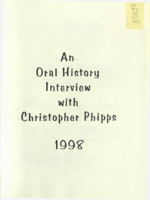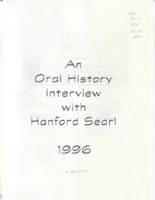Search the Special Collections and Archives Portal
Search Results
Mackey, Maureen, Reverend, 1943-2014
Maureen Elise Mackey was born in October of 1943 in Teaneck, New Jersey. She was a member of the Sisters of St. Mary, and later earned her bachelor’s degree and became a high school science teacher. After serving one of several missions to the Congo, she entered medical school in 1971 at the University of Texas. After several years as a respected physiatrist in Las Vegas, Nevada, Mackey returned to school in 1999 to earn her Masters of Divinity degree at the Church Divinity School of the Pacific in Berkeley, California.
Person

Transcript of interview with Christie Young by Dennis McBride, October 18, 1998
Date
Archival Collection
Description
I've known Christie Young for many years and was grateful she agreed to be interviewed for the Las Vegas Gay Archives Oral History Project. Not only is she frank in what she says, but her background as a researcher in sexual issues and as a straight woman involved in the gay community give her a unique perspective. Ancillary to her donation of this interview transcript to the University of Nevada, Las Vegas, Christie has generously donated her personal journals which detail more than a decade of her life including the years she worked with Las Vegas's gay community . Christie shares the project's concern that documentation of the gay community is ephemeral and vanishes rapidly; her determination that her contribution to that community be preserved greatly enriches our knowledge and will benefit future scholars.
Text

Transcript of interview with Ellen DeLand by Dennis McBride, January 19-20, 1996
Date
Archival Collection
Description
Ellen DeLand was born on April 1, 1931 and went to Santa Monica High School. She was very active in the Las Vegas LGBT community. She was interviewed January 19, 1996.
Text

Transcript of interview with Christopher Phipps by Dennis McBride, November 6, 1998
Date
Archival Collection
Description
Christopher Phipps, attorney in Las Vegas discusses his life. Hailing from Honolulu, Hawaii, and his adventure that led him to Las Vegas, Nevada.
Text

Transcript of interview with Kerin Scianna Rodgers by Dennis McBride, February 24, 1998
Date
Archival Collection
Description
Kerin Rodgers owned a retail fashion store and modeling agency with a friend in Santa Monica, California. She came to Las Vegas in 1966 to work at The Broadway department store. She bought a home in the John S. Park Neighborhood in 1974. Popular radio personality; active in local and national politics.
Text

Transcript of interview with Hanford Searl by Dennis McBride, November 2, 1996
Date
Archival Collection
Description
Dennis McBride interviews Hanford Searl about a number of things: his being gay, his being gay in Las Vegas and other places, religious issues. Also, some information about working at the Las Vegas Review-Journal, and for Bob Brown at the Las Vegas Valley Times.
Text
Lee Plotkin oral history interviews
Identifier
Abstract
Oral history interviews with Lee Plotkin conducted by Dennis McBride on August 02, 10, and 16; and October 04, 2006 for the Las Vegas Gay Archives Oral History Project. In these interviews, Plotkin talks about his reaction to Lieutenant Governor of Nevada Myron E. Leavitt's claim that attending the Nevada Gay Rodeo violated Nevada's sodomy laws in the early 1980s. Plotkin recalls his childhood, coming out during high school, his early involvement with the Las Vegas, Nevada gay community, and his memories of Lieutenant Governor Leavitt and Leavitt's family. Plotkin also discusses the development and activities of LGBTQ organizations and demonstrations, including Golden Rainbow and Gay Pride. Lastly, he talks about the repeal of Nevada's sodomy laws in 1993, the defeat of Nevada Citizens' Alliance's anti-gay initiative petition Minority Status and Child Protection Act of 1994, and the growth of the Las Vegas LGBTQ community.
Archival Collection

Raul Daniels interview, July 3, 2019: transcript
Date
Archival Collection
Description
Interviewed by Maribel Estrada Calderón. Born in Chihuahua, Mexico in 1979, parents immigrated to US when he was pre-school age. By 1989, they had moved to Las Vegas where father got a construction job. Today, Raul is Vice President of Catering with the Station Casinos/Hotels. Married to Ace Daniels.
Text
Carratelli Family Collection on Gay Rights in Nevada
Identifier
Abstract
The Carratelli Family Collection on Gay Rights in Nevada (1992-2002) consists of documents and ephemera from various gay rights organizations and events in Las Vegas, Nevada. In addition to documents, fliers, and meeting minutes, the collection houses a box of t-shirts from various gay events and campaigns. The collection is especially focused on issues of Gay Pride organizing.
Archival Collection
Lavern Cummings and Tony Midnite oral history interview
Identifier
Abstract
Oral history interview with Lavern Cummings and Tony Midnite conducted by Dennis McBride on August 29, 2000 for the Las Vegas Gay Archives Oral History Project. In the interview, Cummings and Midnite discuss their work as female impersonators in Las Vegas, Nevada during the late 1960s and 1970s. They also talk about other impersonators and performance venues in Las Vegas and around the United States. They explain the distinctions between transgender and straight performers, and the perceptions of transgender and straight audience members. Other subjects Cummings and Midnite cover include their early lives and arrivals to Las Vegas, and the history of sex reassignment surgeries beginning in the 1930s.
Archival Collection
